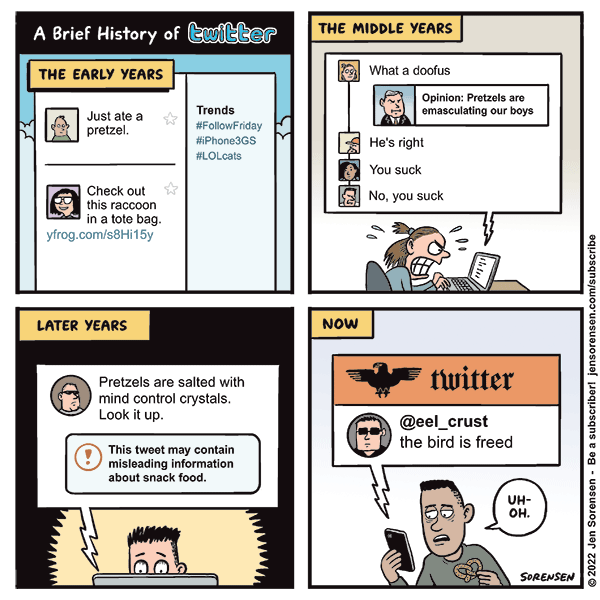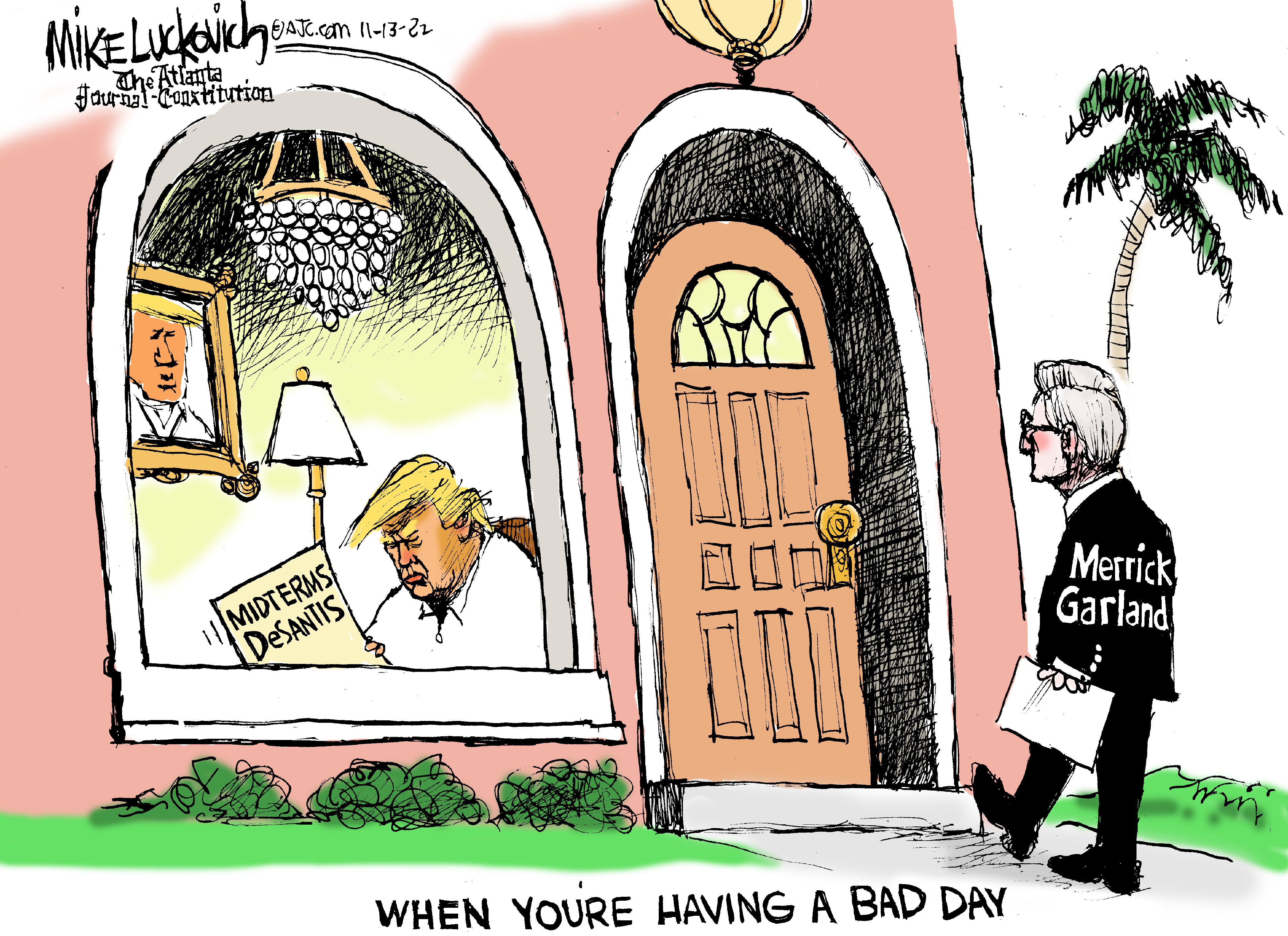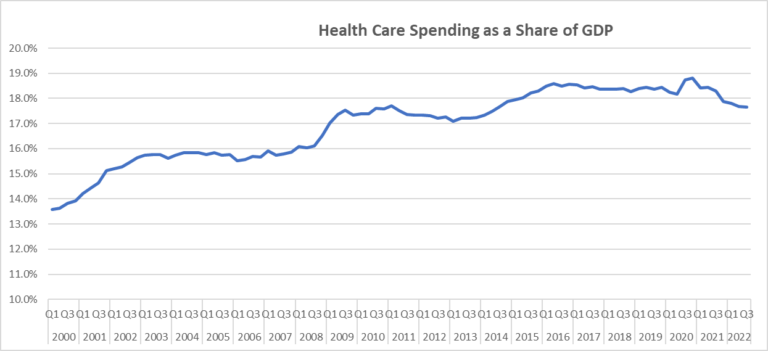Every county, every vote. ... I never expected that we were going to turn these red counties blue. But we did what we needed to do. And we had that conversation across every one of those counties. And tonight, that's why I'll be the next U.S. senator from Pennsylvania.
This week's featured post is "Notes on the midterm elections".
This week everybody was talking about the midterms
That's the subject of the featured post.
I noticed this too late to include in that post, but it perfectly illustrates how unlikely MAGA Republicans are to learn from their mistakes. Like their object of worship, they don't make mistakes, so how could they learn from them?
The American Greatness blog has put its finger on who's to blame for MAGA candidates' failure: the voters.
The problem here is voter quality.
The picture we got from Tuesday is that of a decadent, vegetative electorate easily swayed by platitudes and sentimental appeals, fervently attached to its entitlements. ... Republicans performed well with married men and women—the people who should be the center of our civic life, while Democrats dominated with unmarried women and the twitchy, nihilist Gen Z.
Again: voter quality.
The writer only expects things to get worse "after another 10 or 15 years of mass immigration have taken their toll". He doesn't say it, but the obvious answer is to give up on democracy entirely and take power by force.
David Frum recalls how after 2016, reporters from the "liberal media" went on tours of small-town diners to connect with the white-working-class voters that had surprised them by turning out for Trump. Lots of liberals (me, for example), read J.D. Vance's Hillbilly Elegy in an attempt to understand. He wishes MAGA Republicans would do something similar now, but he doesn't believe they will. He quotes historian Bernard Lewis:
The question, ‘Who did this to us?’ has led only to neurotic fantasies and conspiracy theories. The other question—‘What did we do wrong?’—has led naturally to a second question, ‘How do we put it right?’ In that question … lie[s] the best hope for the future.
and Twitter

It's been stunning to watch how quickly Elon Musk has destroyed his reputation as a great businessman. The problem in a nutshell is that Twitter's revenue comes from advertising, and most advertisers hate to have their ad next to hate speech. It's just a bad association. So they got spooked when Musk described himself as a "free speech absolutist" and fired Twitter's content-moderation people. That flight of advertisers tanked the company's revenue, and now Musk is floating the possibility of bankruptcy.
One of the more interesting takes on this situation comes from Josh Marshall. Marshall's TPM site used to be supported by advertising, but after years of trying to make an advertising model work he moved to a subscription model. (His Twitter article is behind his paywall, so I'll quote liberally.)
Because of that, for upwards of fifteen years I had to deeply immerse myself not only in the advertising business generally but in the niche of advertising in political media. It was a huge part of my work for years and I had to understand it really, really well — because the existence of TPM depended on it. ...
When I first got into advertising, TPM was hot. We had a big audience and it was pretty clear that it was just a matter of agreeing to sell this lucrative ad space. Our audience was educated, fairly well off. We would print money.
I soon realized it was quite a bit more complicated.
It’s not just that advertisers don’t want to be near hate speech or awful things. It goes way beyond that. They want to tell you about their brand when you’re in a good, comfortable, feel-good moment.
He points out that the Drudge Report had a huge audience for many years, but it never had high-quality advertisers, because it was "hot and contentious" and left its readers in an "agitated state".
This aspect of the advertising business is actually a big, big reason for what we sometimes call “bothsides” journalism. This is often presented as an outmoded style of journalism. It’s really more a business model. In a politically polarized society advertisers are very, very cautious about giving any hint that they are taking sides in the great political or political factional controversies of the day.
So while it may look like Musk has gotten into the social media business, actually he has gotten into the advertising business, which he doesn't understand.
He wants to be the world’s biggest troll, play to his new far-right/Trumpy fan base and have all the high dollar national brand advertisers flock to the platform he just wildly overpaid for. That was always an absurd proposition.
Wish I'd said this: "Buying Twitter is Musk's invasion of Ukraine." Guys who surround themselves with people who believe they are geniuses eventually start doing stupid things.
Wired explains how Twitter has become a "scammer's paradise".
and Ukraine
Ukrainian troops have taken Kherson, a key Black Sea port that the Russians occupied in the early days of the invasion. President Zelenskyy visited there today, and vowed that "We are step by step coming to all the temporarily occupied territories."
I'm not an expert on Russian or Ukrainian culture, but I know that the folklore is full of heroes who confidently bluff and bluster. I remember Boris Yeltsin -- backed by nobody in particular at the time -- standing on a tank outside the Parliament building and announcing that he would see the leaders of the ongoing coup brought to justice. It worked.
It's hard to imagine a bigger contrast of imagery than Zelenskyy touring a front-line city versus Putin sitting alone at the end of his long table. One of them is a folk hero and the other isn't. I have to think that the people of both countries see that.

Last week I linked to Masha Gessen's warning in The New Yorker that Putin might really use nukes. Now Alexander Gabuev is saying something similar in The Atlantic.
and Trump's legal situation

Getting past the midterms has reawakened speculation about when or whether Trump might be indicted for a variety of crimes. (DoJ policy discourages indictments that might influence an election.) The source I trust most here is Marcy Wheeler. She's been following the investigations closely, but tries to avoid making sensational claims that she'll have to walk back later.
An indictment of Trump is not going to happen today. In the stolen document case, that’s likely true because DOJ will first want to ensure access to the unclassified documents seized in August, something that won’t happen until either the 11th Circuit decision reverses Judge Aileen Cannon’s decision to appoint a Special Master (that will be ripe for a hearing after November 17) or after a judgement from Special Master Raymond Dearie on December 16 that Cannon chooses to affirm. It’s not impossible, however, that DOJ will take significant actions before then — perhaps by arresting one or more of Trump’s suspected co-conspirators in hoarding the documents, or by executing warrants at other Trump properties to find the documents still believed to be missing.
The next most likely indictment to drop is in the fake-electors scheme, but Wheeler thinks there's a layer of conspirators who will be indicted before Trump. Ditto for January 6. She isn't sure what to predict about the Fulton County election-tampering investigation, which is still is fighting to get testimony from Lindsey Graham and a few other witnesses. (One objection I have to the media coverage of these battles: They're being treated as if avoiding testifying is a normal thing to do, and few are drawing the obvious conclusion that Graham et al know things they don't want investigators to know.)
Meanwhile, the lawyers who filed Trump's massive (and quickly dismissed) lawsuit against everyone involved in starting the Trump/Russia investigation (i.e., Hillary Clinton, Jim Comey, and 29 others) have been sanctioned by the judge in the case. He ordered them to pay $50K to the court and $16K in legal fees to Charles Dolan, the defendant who asked for sanctions. Such sanctions are warranted under the law when a lawsuit's claims are "objectively frivolous" and "the person who signed the pleadings should have been aware they were frivolous".
The judge's order says:
Plaintiff deliberately misrepresented public documents by selectively using some portions while omitting other information including findings and conclusions that contradicted his narrative. This occurred with the Danchenko Indictment, the Department of Justice Inspector General’s Report for Operation Hurricane, and the Mueller Report. It was too frequent to be accidental.
Every claim was frivolous, most barred by settled, well-established existing law. These were political grievances masquerading as legal claims. This cannot be attributed to incompetent lawyering. It was a deliberate use of the judicial system to pursue a political agenda.
But the courts are not intended for performative litigation for purposes of fundraising and political statements.
Trump's last-ditch attempt to avoid showing his tax returns to the House Ways and Means Committee is at the Supreme Court. The six partisan Republican justices could do their buddy a solid just by dragging their feet until Republicans take over the House (assuming they do) in January. I expect the Court to avoid this unsavory option and make an actual ruling, but it's an open question.
Trump's former chief of staff and Homeland Security Secretary John Kelly is the latest ex-official to describe attempted wrong-doing. He doesn't have a book to sell, but ...
Mr. Kelly said he chose to respond now because Mr. Trump had publicly claimed last week that he had used the Justice Department and the F.B.I. to help Gov. Ron DeSantis win election in Florida in 2018. Mr. Kelly, who was Mr. Trump’s chief of staff at the time, said Mr. Trump never made such a request. If he had, Mr. Kelly said, it would have been an improper use of the Justice Department and the F.B.I.
(MSN fact-checked Trump's statement and found "no evidence" to support it.) Kelly went on to describe other times when Trump wanted to misuse the IRS and other government agencies to help his friends or harm his enemies.
“I would say, ‘It’s inappropriate, it’s illegal, it’s against their integrity and the I.R.S. knows what it’s doing and it’s not a good idea,’” Mr. Kelly said he told Mr. Trump.
“Yeah, but they’re writing bad things about me,” Mr. Kelly said Mr. Trump told him.
A spokesman for Trump denied the claims, calling Kelly "a psycho".
Meanwhile, Mike Pence does have a book to sell, so he's finally dishing on Trump. Trump's "reckless" words on January 6, he says, "endangered me and my family". Maybe he should have told the Senate that during the second impeachment trial.
and you also might be interested in ...
A Trump-appointed judge has blocked Biden's student-loan forgiveness program. This case will have to work its way through the system before anybody sees debt relief.
A study in the New England Journal of Medicine compared Massachusetts school districts that dropped mask mandates to those that maintained them. Conclusion: masks work.
Among school districts in the greater Boston area, the lifting of masking requirements was associated with an additional 44.9 Covid-19 cases per 1000 students and staff during the 15 weeks after the statewide masking policy was rescinded.
Two more raped minors have had to leave Ohio to get abortions.
Remember that billion dollars Alex Jones is supposed to pay to the Sandy Hook parents? That was just the actual damages. A judge has added another $473 million of punitive damages.
Dean Baker points out something important: In the early years of the 21st century, health-care spending as a percentage of GDP was headed inexorably upward. That seemingly unstoppable trend caused economists to make a lot of ominous projections. But instead health-care inflation moderated, and the percent of GDP spent on healthcare is now below where it was in 2014, when ObamaCare was implemented.

This is an example of how good government is hard to campaign on. Democrats passed the Affordable Care Act in March of 2010, and then got clobbered in the 2010 midterms, largely because Republicans were able to raise so many fears about "death panels", rationing, and all sorts of other things ObamaCare supposedly included.
So here's to all the Democrats in Congress who lost their seats in 2010 because they did the right thing. The purpose of having power should be to use it well, not to hang onto it.
Friday wasn't just Veterans' Day, it was also Kurt Vonnegut's 100th birthday. I recently passed through Indianapolis, Vonnegut's home town, and went to the Vonnegut museum there. I particularly enjoyed reading Vonnegut's rejection letters from publishers, which are framed and hung on the wall.
and let's close with something powerful
Like a fleet of snowplows. Last year, the Minnesota Department of Transportation started a contest to name new snowplows. Predictably, the big winner was Plowy McPlowface.
But now that the obvious name is out of the way, things have gotten more interesting. The next generation of plows named by the public display much more creativity.

Runner-up names are also listed. My favorite is Sled Zeppelin.
No comments:
Post a Comment